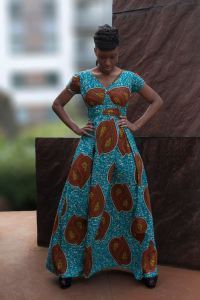learn to listen

African print maxi dress by Gitas PORTAL 2011
I think I’ve cracked the code. Yesterday I wrote for several hours in the evening and managed to crank out over 2000 words. And that happened because when I got home from my meeting with Meredith and Grace, two Tostan volunteers, I did NOT blog. My head was crammed full of ideas and possibilities, and for a couple of hours I just sat with my thoughts and mentally rearranged my novel outline. Then I pulled up the file, tweaked my actual outline, and got to work. I was struck by something the young women told me—rather, they thanked me for listening to them as they shared their experience. I’d never really thought about that—how challenging it might be to find a sympathetic audience once you’ve lived and worked abroad, especially when the work they do involves such complex issues. It would be particularly hard to convey that experience to someone who had never been to Africa and/or thought about the politics of international development (which is most Americans). I couldn’t thank them enough for answering my many questions; in The Return, Keem’s sister Nasira is in Senegal working with an NGO that focuses on women’s health. Tostan has a lot of different programs but they’re often reduced to (or known best for) the work they do to end female genital cutting. I want to find ways to weave Nasira’s politics into the narrative without getting on my feminist soapbox. And I want to convey the complexity of FGC, the tension between respecting tradition and reshaping cultural attitudes. My tour guide joked that he was “Muslim on the left”—he drinks beer but not during Ramadan. Then he asked me if I was Christian “on the left or right.” I usually just say that I was raised in a devout Christian family. I haven’t entirely rejected my Christian upbringing but I did make a deliberate decision not to live like my parents once I began living on my own. I admire the discipline that Islam demands of its practitioners but I struggle sometimes to understand how religion could determine every aspect of one’s life: what you eat, what you wear, how you talk, how you socialize, or marry, or parent, etc. I’ll need to talk to more Muslim teens as I work on this novel so that I better understand the way they navigate both here and in the US.
Last night I was chatting online with Sayida—a friend I met ten years ago when we both signed up to teach in Djibouti. I left after 5 weeks but Sayida toughed it out and over the years we kept in touch. Now she’s expecting her first child and her partner’s sister is a seamstress here in Dakar, so in a little while I’ll be meeting Fatou to have my measurements taken. She speaks Wolof and French only, so I’ve been using Bing translator to brush up on my vocabulary and phrasing, and I went online this morning to find a style of dress that I like. Shorten the skirt on this one and it’s parfait!





